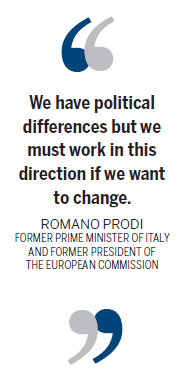People
Logic of realpolitik
Updated: 2011-07-15 11:09
By Matthew Morgan (China Daily European Weekly)
 |
"Do you prefer the medical solution (of the US), in which you spend 17 percent of GDP, and not everybody is covered? Or do you prefer the Italian solution, in which you spend 7 to 10 percent, everyone is covered, and the average life span is much higher than in the US?
"For China's future, in terms of political structure, welfare policy, and the perception of its political future, I think that Europe is much more useful to China," says the robust 71-year-old. "But we lack the political harmony and attitude to capitalize on that.
"We are losing these occasions, because of the European division, because we don't have an autonomous strategic policy," he says.
This view can be typified by former US secretary of state Henry Kissinger, who in his latest book On China barely mentions Europe, he points out.
"I think that the US is more unbiased than we are in Europe. Maybe it is a deeper problem that we have. I hear the US is taking interest in this change (the shift to the East and the possible end to dollar hegemony) also.
"Clearly this does not mean we are on the brink of breaking of the monetary system (into) a new economic system."
He acknowledges the "positive" role played by China in the European financial crisis by buying bonds, which he also sees as a strategic move by Beijing to diversity its foreign reserves away from the greenback.
But Prodi is skeptical about a move to IMF Special Drawing Rights (SDRs), the nearest the world has come to the fulfillment of Keynes 1940s vision of a global currency, as the basis for central bank reserves.
"SDRs are not a step toward a common world currency but something similar. I don't see an agreement on such big issues, especially not in the foreseeable future."
Regarding China's position on
the gradual shift away from the dollar he says: "I think China is not interested in reform today because they will be better off reforming tomorrow (for a) long period of time."
He remains adamant that Europe and China are natural partners.
"The basic intellectual foundation (of Europe) is the welfare state
and this is something on which we can work together and China will meet us. In theory, we are much close to China than the US. We have political differences but we must work in this direction if we want to change.
"Government leaders matter, of course; but, over the long term, public opinion will largely determine the nature of the Euro-China relationship. A sudden unitarian policy toward China would be difficult. But (such) convergence (is) in the (current) mood, to change the politicians you know,
this is realistic. This is very realistic.
"There is already, at least in some countries (this feeling). In Italy, for example, this has already started because now there is a little more balance between exports and imports. Now you have companies profiting because of China and so this start is not a dream."
E-paper

Ringing success
Domestic firms make hay as shopping spree by middle class consumers keeps cash registers ringing in Nanjing
Mixed Results
Crowning achievement
Living happily ever after
Specials

Ciao, Yao
Yao Ming announced his retirement from basketball, staging an emotional end to a glorious career.

Going the distance
British fitness coach comes to terms with tragedy through life changes

Turning up the heat
Traditional Chinese medicine using moxa, or mugwort herb, is once again becoming fashionable
